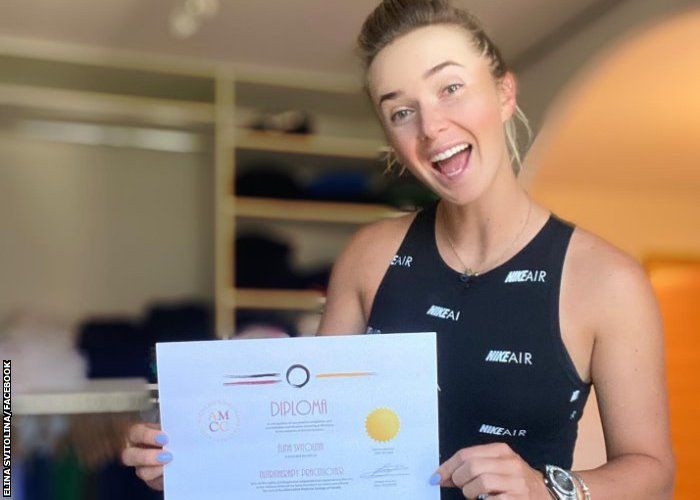
In her second BBC Sport column at the Australian Open, Wimbledon semi-finalist and WTA star Elina Svitolina discusses how watching YouTube videos of neuroscientist Andrew Huberman have helped inspire her successful comeback.
Psychology is a topic which I am really interested in – I read a lot of books about it and watch a lot of YouTube videos.
I really love to watch videos from a guy called Andrew Huberman, who is an American neuroscientist at Stanford University and host of a podcast.
It’s great how he explains from a science perspective how the mind works and what we go through as humans.
As well as finding out about his research, I also like to watch other motivational videos and TED talks.
The mind is a big, big part in tennis. From time to time I work with a psychologist to help deal with some situations where I can’t find a way myself.
But just because someone tells you to try something it doesn’t mean it will work 100% – you have to find the best way which works for you.
I always listen to the people around me and then make my own decision.
This is what works for me.
Everyone is different but it is good to learn about different ways so I can tailor them to help me. I try to find out what works for me in any particular time.
The brain is a muscle you train and I always try to find new ways of optimising it.

Studying psychology is perhaps something I might decide to do after my playing career.
I’m also really interested in nutrition, too, and studied that in a two-year online diploma through the Alternative Medicine College of Canada.
It is important to know the basics – how it works and learning about carbs, sugars, vitamins and what our body needs.
A lot of people don’t know the basics and struggle as a result. In sport, it makes such a big difference.
Being an athlete is not just hitting forehands and backhands. It is learning about nutrition, psychology and coaching.
Dealing with stress has enabled Slam runs
At the beginning of my comeback last year, I thought it would take time to reach a good level and do as well as I have done at the Grand Slams.
It makes me extremely proud that I’ve reached at least the third round of all four majors since I returned in March after having my daughter Skai.
When you start playing again you have the highest goals for yourself, of course, and want to win every time you step on the court.
If you don’t have belief there is no point going out on the court.
But the hardest part of returning after giving birth, I’ve found, is how your body reacts to stress situations.
In a tennis match there are many situations where you find yourself under a lot of pressure. The type of tournament, how many people are watching, the pressure you put on yourself as well, plus the expectations from people around you and people back home.
Dealing with the stress was not easy in my first tournaments back, especially the big ones in Madrid and Rome. These were overwhelming and I found I was not dealing with it as well as I was before.
Readjusting to stressful situations during matches was hard at the beginning but once I overcame this hurdle I was able to refocus and deal with these moments much better.
Top-10 return is my 2024 target
I’m happy where I am now. I’m playing well and striking the ball bigger and my movement is back after an ankle injury which affected me at the US Open.
In my first Grand Slam back I reached the quarter-finals at Roland Garros and the highlight last season was getting to the semi-finals of Wimbledon, where I played very well against great players.
To beat Iga Swiatek – the world number one – like I did in the quarter-finals there, you need to be sharp.
After Wimbledon I took a few days off to reflect on the things I did good on the court and how I handled the tough situations.
Sometimes life goes super quick – it can feel like 200mph – so it is important to stop and look back.
I didn’t move as well as I wanted at the US Open because of my ankle but now I’m back and I’m happy with my progress in Melbourne.
Tennis-wise, I feel I’m getting better and better, and I’m physically getting stronger.
My goal this year is climbing back into the top 10 of the world rankings and, with how I’m feeling now, I believe I can do it.
Elina Svitolina was talking to BBC Sport’s Jonathan Jurejko at Melbourne Park.
|
Australian Open 2024 |
|---|
|
Venue: Melbourne Park Dates: 14-28 January |
|
Coverage: Commentary every day from 07:00 GMT on Tennis Breakfast on Radio 5 Sports Extra and BBC Sounds, with selected live text commentaries and match reports on the BBC Sport website and app |
-
Live scores, results and order of play
-
Alerts: Get tennis news sent to your phone